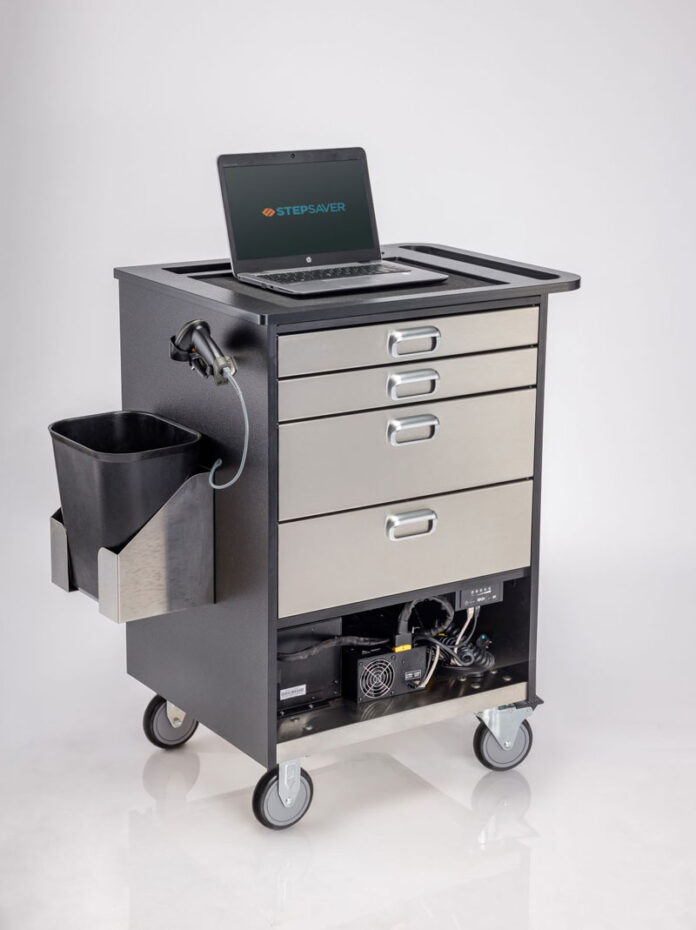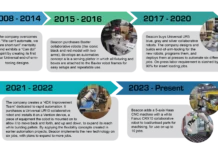by Lara Copeland, contributing writer, Plastics Business
Last spring when much of the world shut down, people stayed home, often rediscovering long-lost hobbies, streaming binge-worthy shows or taking time to try to relax while chaos ensued outside… But not Heather Meixel, CEO and president of Bamar Plastics, South Bend, Indiana, custom injection molder for the medical and automotive industries. “I never just sit down and do nothing; I’m super high-energy,” she said. With the extra time on hand, Meixel decided to reinvigorate a side project she’d been working on since she took over the company about five years ago – the STEPsaver mobile cart.
As a self-proclaimed value-stream mapper, Meixel spent her early days at the company witnessing a common practice in manufacturing, and she wanted to improve it. “Our normal day consisted of collecting samples from all our molding machines and taking them into the quality office for inspection,” she said. “Our quality engineers were running from press to press, grabbing shot after shot and then taking them to the quality office to make sure we’re making the correct parts, both visually and dimensionally.” Often by mid-afternoon, it would come to their attention that something in the process went awry. “We were producing a bunch of scrap at that point,” she added. The process was taking too long between the parts coming off the line and getting to the quality office. So Meixel set out to create a tool that would roll from press to press instead.
Meixel described the first generation of the STEPsaver as a toolbox on wheels. It featured drawers, a toolkit and a timer to time parts so they were cooled enough for inspection. “However,” she stated, “we quickly realized that the drawers were packed with junk, so we knew we had to make some improvements.” For the second generation, Meixel sought help from a designer in Indiana who builds custom cabinetry and asked him to create a prototype. “He worked with our engineers and came up with some really neat, brilliant designs and manufactured the cart,” she said. Throughout the years, generation three and four of the STEPsaver were produced, but as times got busy, the concept was set aside – that is, until last spring.
When everything was going into lockdown last March, Meixel picked up the phone. Not only did she wish to maintain contact with suppliers and customers, but she also wanted to check in with other local business professionals about participating in a focus group. “I told them I had this product to work on while we didn’t have a lot going on, and that I’d like to make it marketable,” she said. A total of 12 professionals gathered for the focus group, with about half the people participating over Zoom and others socially distanced in the factory. She introduced the fourth generation of the STEPsaver to the group and asked them how she could make it marketable, and the advice she was given “was awesome!” according to Meixel.
The engineers and designer went back to the drawing board with a big list of wishes and improvements that would “make our cart perfect for us and almost every industry,” Meixel said. “We added charging stations and holders for cellphones, included the option to have one or two monitors, and then added a micro-CPU unit so we could input data on the spot.”
Additionally, the redesigned cart also featured a barcode printer or an option for a printer that feeds letter-size paper; a backlit surface to illuminate contamination, short shots or other molding defects; a recessed area with rubberized surface to keep tiny parts and laptops in place; and even more options, like a digital magnifying microscope and a lighted magnifying glass. To communicate wirelessly with customers on the spot or hold a quick team meeting in the middle of the shop floor, Meixel’s team wanted to add connectivity. They also wanted a portable battery that could last up to eight hours to power each of these items. And, there is a small cubby for a trash bin.
The final product, generation five, is durable. In fact, a forklift can ram into it and the cart will not be damaged. Originally made from painted steel, the cart was too heavy and unforgiving. Now, it is constructed of ¾” HDPE and features antimicrobial properties. This plastic is a little lighter but still able to withstand the forklift test. The newest generation also has a better ergonomic feel to it. “Almost all of our inspectors are smallish people, so we wanted to make sure our smallest employee could push this thing around easily,” Meixel said. The cart moves freely, but the wheels also can be locked when the cart needs to be stationary. “The mobility factor is really what makes this so valuable,” she added.
Pleased with the outcome, Meixel said she was encouraged to do something with the finished product, so she entered it into a few contests. It won innovation awards in a local teacher’s credit union contest, MAPP’s contest and another contest through Executive Forum. “It’s won three innovation contests just this year, and we haven’t even sold one of them yet,” she acknowledged, “so it’s great to know other people think this is a good idea, too!”
Realizing how vital the cart has become in just a couple months’ time, Meixel said she has no problem spending money on tools that have such good ROI. “The time saved per day is about two hours, and this directly addresses the overwhelming need to do more with fewer people.”
Not only does it save steps, but it also reduces scrap, she added, “because we aren’t missing deliveries… because we aren’t generating scrap… because we don’t make bad parts… because we caught them early enough where we can adjust processing and keep moving.” She also commented on the cart’s intrinsic value: “It’s so nice to have a customer in the shop, take them over to the cart and show them how the STEPsaver helps us gauge our inspection efforts. They really want to know we’re performing at our very maximum efficiencies,” she noted. Finally, bringing high levels of technology to the floor helps attract young people to manufacturing.
Reflecting on the time and effort it took to achieve a fifth generation of the cart, Meixel said, “You learn through the process that you literally can improve every single one, but at some point, you have to stop.” So, she launched the STEPsaver line of carts with a live website in January 2021. “We are rocking and rolling with this,” she said. “And the entrepreneur in me says, ‘You gotta believe, girl!’”





